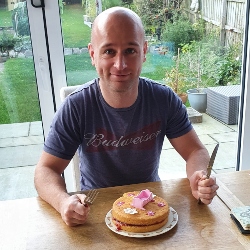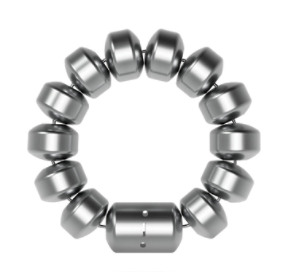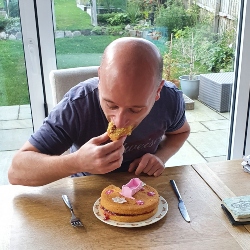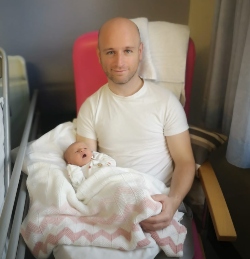Acid Reflux: A thing of the past thanks to pioneering new LINX® procedure
Have you ever felt not physically 100%? That was Peter Harrison’s constant complaint and he considered himself fit and healthy.

Suffering from a swollen throat, irritability, and headaches, he initially put his symptoms down to a strawberry allergy as he had been eating a lot due to a glut of the fruit he had been cultivating.
He visited his GP commenting that he didn’t mind the slight headache, but it was the constant feeling under par that was beginning to impact on his mental health.
“The best way I can describe it is like waking up with a hangover every morning,” he said.
The number of incidences waking up in the morning and feeling like he was under the weather started to increase and even basic medications could not shift the symptoms.
“Because of my job and lifestyle, working long hours it was really difficult to continue at the rate I was because I just felt terrible.
“I would tell people that is like feeling only 75% every day. That 25% feeling is quite a lot especially as I am a chartered accountant, working at a senior level and managing large teams for one of the big four retailers.

“Probably because I use my brain a lot, I started to notice the impact of not being able to eat and sleep. It started to affect my memory and because I was not quite on point, colleagues began to pick on the subtleties which for me, rather than them, was a big problem.
“It would be silly things. I would stumble over my own words and would not be able to articulate clearly, sometimes saying the wrong word even though I was thinking a different one.”
It all began to build up culminating one day in finding it difficult to climb the stairs at work.
“Up until 3 years ago I played rugby religiously. I have always done exercise cycled gone to the gym and prided myself on being physically fit. I always take the stairs to my office on the third floor, and I noticed I was starting to get out of breath.
“I also noticed it was food that could be the trigger, so I booked an appointment with my GP.”
Because of the swelling in the throat his local NHS service started the ball rolling by doing an endoscopy to rule out cancer. Thankfully, there was no cancer, but he did have a small hiatus hernia.

The transformational point was when Peter was reminded that he had private health care through work.
He booked to see Consultant General Surgeon Mr Sarela at Nuffield Health Leeds Hospital.
Mr Sarela picks up the story.
“The hiatus hernia was quite small and didn’t explain the severity of the symptoms. We did a number of tests to try and pinpoint the issue. These included oesophageal pH/Impedance and manometry testing to see if there was acid reflux. These tests showed that Peter had significantly abnormal acid reflux’.
“I asked Peter to consider two procedures that would help: Fundoplication or a LINX® procedure. After a detailed discussion, I suggested he went away and think about both procedures and consider the different pros and cons.”
Treatment for GORD
So, they seek an operation to treat their acid reflux, which was Peter’s option. He was getting regurgitation as the cause of acid reflux. He had been taking medication for some time with limited benefit. The medications were helping but not controlling his regurgitation fully.
This was significantly impacting on his quality of life and subtracting from his enjoyment of life.

“Other than the acid reflux he was a healthy young man. It was important for him. There are two types of operation for acid reflux. The traditional operation which has been used for years is Fundoplication. This involves wrapping a portion of the stomach around the food pipe and that reduces or prevents reflux of acid from the stomach into the oesophagus. For most people it works well to control acid reflux, but it can have quite troublesome side effects,” Mr Sarela said.
One major-side effect is a lot of bloating and wind. People can suffer from excessive flatulence after this procedure which can be embarrassing, and the bloating of the abdomen can be uncomfortable. Another is that for some people it can cause difficulty to swallow. Mr Sarela commented that in a sizeable proportion of patients, which varies from study to study, between a third to a quarter find that the acid reflux can return because simply the effectiveness of the operation has worn off. So, these are downsides.
Mr Sarela explains that a newer operation which Peter had, uses a Magnetic Bead Ring called a LINX®.
“As the name suggests, it is a link or a bracelet of magnetic beads that is put around the lower part of the food pipe just where it joins the stomach, using keyhole surgery. This provides a flexible barrier, allowing food and drink to pass via the food pipe into the stomach but other than when one is eating it closes the food pipe preventing acid from the stomach to find its way back up into the food pipe.
“The advantages over fundoplication are that, although both are done by laparoscopy or keyhole surgery, fundoplication involves more work inside the tummy: we have to divide some of the blood vessels that supply the stomach to wrap the stomach around the food pipe. When you do more there is a greater chance of things going wrong.

“In LINX® there is no need to do that. So, the intervention and the magnitude of what we can do in the tummy is less.
“In terms of side effects like bloating and swallowing they are significantly less with LINX®. They can happen but are less frequent and severe.”
“It is particularly good in controlling acid reflux. However, because it is a new procedure, we still have more to find out about it.”
Peter chose LINX® because he did not like the idea of the fundoplication procedure as it felt more like a major operation. “Because of my age, being fairly young, I didn’t like the idea I would not be able to burp or even be sick and would have to be really careful with what I eat for a long period post op,” Peter said.

It all went well for Peter, and he is back to normal and feeling comfortable.
“The advice they gave me was spot on all the symptoms have gone and I physically felt better a week or so after the op. I actually had an appetite in the morning and could eat and drink normally.
“I am doing well. It was an effective safe procedure. I can now climb the stairs at work and do not feel as tired.
Read more about The Leeds Reflux Clinic
